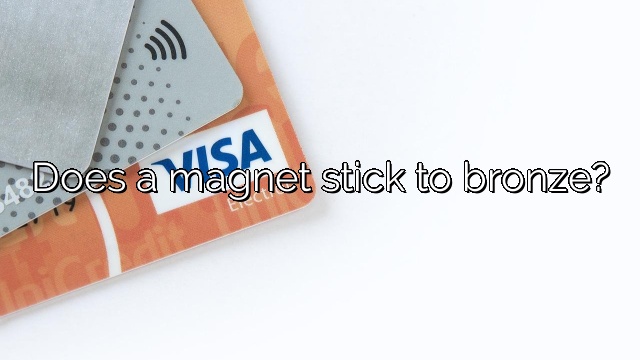Bronze is a mixture (alloy) of mostly copper with about 12% tin, and sometimes small amounts of nickel (nickel can make it very slightly magnetic but, generally, bronze is not magnetic ).
Bronze has almost no magnetism whatsoever, which means that no magnet will be attracted to it. Even the most powerful magnets are not drawn to bronze. This is actually an extremely useful property when testing for bronze.
Biden Fires Warning Shot for Retirees ... Are You at Risk?
Do magnets stick to brass or bronze
If we mix additional zinc and copper with a metal alloy, we also get an actual non-magnetic connection. Thus, brass is not only magnetic. Like copper, aluminum and zinc, brass interacts with moving heat. In the video below, the steel plate on the pendulum moves very quickly when the bar magnet is out.
Is bronze magnetic or nonmagnetic
Bronze is always non-magnetic, but some alloys containing iron or only nickel can be magnetic.
How can you tell if something is bronze or copper
Copper has a characteristic reddish brown color. Brass has a lighter yellowish golden hue. Bronze, on the other hand, is dimmer, and your old watch has a sepia tone and usually has small rings on the surface. You can lightly tap the metal to see if it is copper or an alloy.
How can u tell if something is bronze
Bronze is characterized primarily by its dull golden color. You could also tell brown from brass because faint rings appear on the surface of the bronze.
How to test for bronze with a magnet
NEW Rod Gold Penetrates the gold surface to a depth of 0.08 inches (2 mm).
Small Bar – For small specimens of specialty metals such as 1 gram bars, combination bars, 1/10 ounce alloys, etc.
Large – a core for coins, as well as ingots weighing from 1/4 to 1 ounce.
What kinds of metals do not stick to magnets
copper
carbon
gold
Silver-
fulfill
bismuth
What metals are not magnetic
[Long study of magnetic technology and interdepartmental metal powder core forming 3000 tons every year Magnetic technology clearly indicates that the company’s soft coating project started not so long ago, and there is still a movement between
Did the iron sulfide stick to magnet did the sulfur powder stick to the magnet
They just took two elements and then combined them into a mixture. You can separate the components created by mixing by stirring the all natural powder with a magnet; Iron currently holds the chips to the magnet, while sulfur does not. … The elements will react and form iron sulfide, which has always been a compound.
Does bronze stick to a magnet
COPPER / BRASS / BRONZE Copper is not magnetic. …bronze should be a mixture (alloy) of realtors with mostly about 12% tin and in some cases small amounts of nickel (nickel probably makes it very weakly magnetic, although bronze is not only magnetic at all). .
Does a magnet stick to brass or bronze
/ Copper BRASS versus BRONZE Copper is not magnetic. Brass is usually a mixture (alloy) of copper and mostly zinc (zinc is not considered magnetic). Bronze is a mixture (alloy) of mostly copper with about 12% metal and sometimes a small amount of pennies (nickel can make it very moderately magnetic, but in general bronze is really magnetic).
Do THIS Or Pledge Your Retirement To The Democrats
Does a magnet stick to bronze
Because copper and bronze are not permanent magnets, even with the strongest magnets, you and your family can narrow down your choices. Keep in mind that although brass is definitely magnetic, it is very light. If you take a very strong magnetic field and bring it near a brass object, there is a chance that the object will attract the magnet.
Does a magnet stick to bronze or brass
Magnetic. … Since copper and bronze are not magnetic, even with the most intense heat, you can clean your stains. Keep in mind that although steel is magnetic, it is very light. If you take a very strong magnet and bring a brass object near it, there is a chance that the likely object will attract the magnet.
Why do iron filings arrange themselves in a definite pattern when sprinkled around a magnet A due to force exerted by a magnet within its magnetic field B due to the force exerted by a magnet outside its magnetic field C due to the pressure of the magneti
Why does the iron filings take control in a certain pattern every time they scatter around a magnet? This is probably due to the fact that the entire iron filling becomes a small important magnet and, thanks to a precise magnet, experiences its own force in a certain direction of the actual magnetic field.
ALERT: Secret IRS Loophole May Change Your Life


